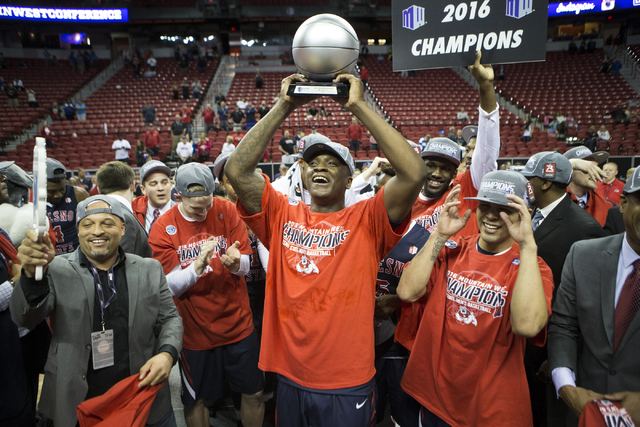Mountain West needs to change scheduling habits to get NCAA’s respect

When those in the Mountain West offices awake today, and you have to believe the NCAA Tournament selection show will have mercifully ended by then, they need to collectively look in the mirror and realize a clear message has been sent:
Change how your basketball teams schedule or risk becoming the Big West.
Which, as a one-bid-league, the Mountain West is closer to than at any other time in its history.
Most assumed for months Selection Sunday would deliver the conference just one berth into the 68-team bracket, a prediction that became fact when league tournament champion Fresno State was made a 14 seed in the Midwest Region and regular-season champion San Diego State was left out.
It’s the first time since 2001 the Mountain West received just one bid, and hidden within the nonsensical banter of the selection committee chairman explaining why non-Power 5 teams were again treated with the respect of a bug on your windshield were obvious hints to those from lesser conferences on how they continue to be disregarded in the room.
The five teams discussed for a final spot in the bracket were Tulsa, Monmouth, St. Bonaventure, Valparaiso and South Carolina, meaning a team (San Diego State) that won the Mountain West by three games wasn’t anywhere near such an important conversation.
Consider these comments from committee chairman Joe Castiglione on San Diego State: “They only went 2-3 against the better competition within the league, mainly Fresno State and Boise State.”
I have covered 21 straight NCAA Tournaments and never heard such a reference about results within a conference when it came to why a team didn’t get an at-large berth.
Translation: The committee held zero respect for Mountain West basketball this season.
Like, um, less than none.
Kentucky coach John Calipari is correct in saying there are major issues with the selection committee, two being the lack of basketball people on it and the fact members admittedly don’t use the same criteria when voting.
But if you listened closely to Castiglione, a few points became obvious: The assumption that KenPom is now the metric of choice for committee members is absolutely correct, and it’s not the actual Ratings Percentage Index of a team that matters most but the nitty-gritty numbers within it.
Specifically, wins against the top 50 are really good and losses against 200 or lower RPI teams are resume killers.
Which brings us to changes the Mountain West should make in hopes its at-large resumes won’t be laughed at so loudly by the committee:
1. It should play a 16-game conference schedule instead of 18 so as to allow for more nonleague opportunities against top 50 and top 100 teams. Brigham Young and Utah are gone. This isn’t the same conference as years past. Teams need more chances to schedule the sort of meaningful games league play doesn’t allow.
2. It shouldn’t for a second think about extending the Mountain West-Missouri Valley Challenge, which made a little sense in 2009, when both leagues were good, but the idea it now improves Mountain West RPIs is foolish.
Said one Mountain West coach Sunday: “At least the Mountain West/Missouri Valley (Challenge) is intact. Fresno State might have been a 15 seed.”
3. The conference needs to begin imposing financial penalties against teams that schedule opponents with an RPI of 150 or worse from the previous season or rewarding those who schedule road/neutral games against top 50 RPI teams.
All too drastic? Too bad. If the conference doesn’t realize that when a 16-2 champion isn’t among the final four teams discussed for an at-large berth, it has a serious problem when it comes to perception from those casting votes.
Monmouth deserved to be in the field before a second Mountain West team.
So did St. Bonaventure.
Tulsa had no business getting the final at-large berth, and you could make an argument Vanderbilt and Syracuse — combined 1-9 vs. the top 50, 6-17 in road games and 6-16 against the NCAA field — also should be nowhere near the tournament.
For many reasons, this might be the worst NCAA bracket in decades when it comes to which at-large teams were selected.
And don’t get me started on that marathon two-hour selection show, a ridiculous idea that made sense only for lining the pockets of TV executives but only proved Charles Barkley doesn’t own any touch-screen gadgets.
As for the Mountain West, things became quite clear as teams were announced.
“We were a one-bid league,” San Diego State coach Steve Fisher said. “It doesn’t have to stay that way. We have to all collectively say, ‘How can we get better?’ Each team has to do their part. You have to schedule, and then win. And that’s everybody. We’re an 11-team league now. You have to say, ‘Where can we get some neutral site games?’ How can the commissioner help?’ Everybody has to do their part, everybody has to say: ‘How collectively can we make this league that’s thought of as a multi-bid league?’”
Easy. Schedule differently.
Or risk becoming the Big West.
Ed Graney can be reached at egraney@reviewjournal.com or 702-383-4618. He can be a heard on “Seat and Ed” on Fox Sports 1340 from 2 p.m. to 4 p.m. Monday through Friday. On Twitter: @edgraney.












